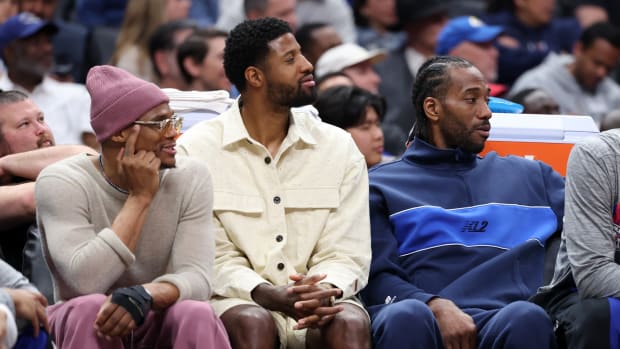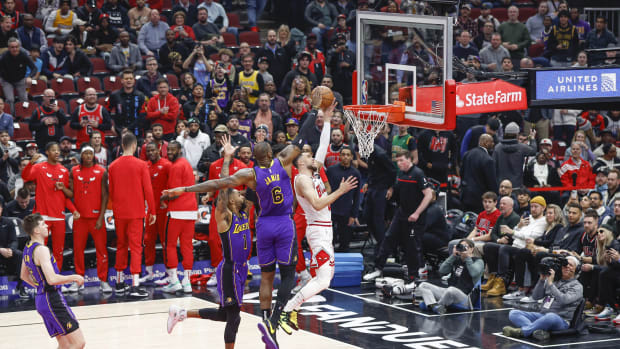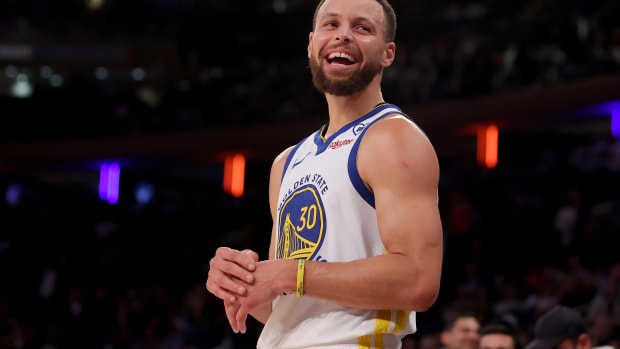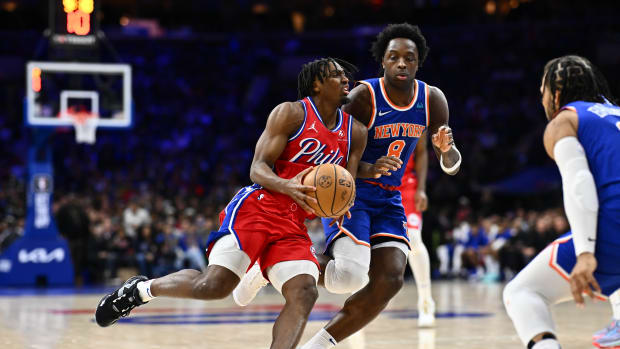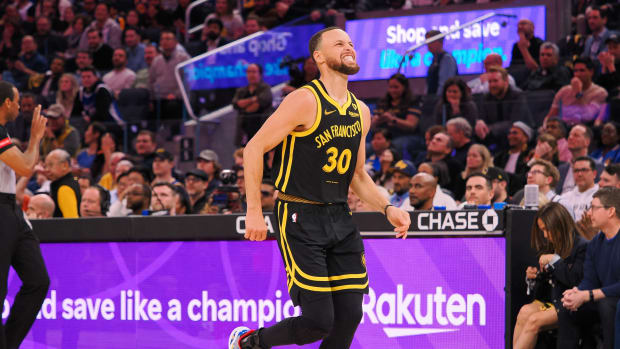
Examining LeBron James' options from a basketball standpoint
After a week of free agency, the Cavaliers have reportedly joined the LeBron James sweepstakes. Their point of entry, according to Yahoo Sports, is James' agent, Rich Paul. In the process of meeting with a number of teams last week, Paul apparently conveyed to Cleveland that it ought to pursue the four-time MVP in earnest by clearing enough cap room to accommodate a max deal. James' intentions may be unknown, but the self-starting intrigue of his possible return to the Cavaliers gives this rumor a particular spark.
Of one thing we can be sure: It will take more than the public erasure of owner Dan Gilbert's bile, dipped in Comic Sans, for Cleveland to genuinely pique James' interests. There are overtures that must be made and relationships that must be mended. Just as important, the Cavs have to actually go about clearing the cap room required to sign James at the maximum salary. At present they're only within range of doing so; between all committed salary and the cap hold of No. 1 pick Andrew Wiggins, Cleveland has a practical cap figure of roughly $46.4 million – almost $9 million too much to fit James' max. That gap cannot be cleared without the unloading of at least one significant contract, for which Jarrett Jack is the most obvious candidate.
SI.com's 2014 NBA free agent tracker
Cleveland made a clear mistake by signing Jack to a four-year, $25.2 million contract last summer – a hefty sum for a backup guard who plays only one side of the ball. Now, the Cavs (provided they also release the nonguaranteed Matthew Dellavedova and Scotty Hopson) are one Jack-sized deal away from approximating max-level cap room. Finding a team under the cap willing to take on the remaining two-plus years of Jack's deal would be tricky, but Cleveland has reportedly found its middleman. When in need of dumping the salary associated with decent talent, NBA teams apparently need look no further than Brooklyn; in an effort to replace the outgoing Shaun Livingston, the Nets appear willing to take back Jack in exchange for Marcus Thornton. The latter is of less interest to the Cavs than his contract, as Thornton – unlike Jack – will be in the final year of his deal. Should Cleveland attach a first-round pick (of which the Cavs have several) to Thornton's $8.6 million salary, it should be able to find a taker among lowly teams with cap space to spare.
If such a deal could be executed without a hitch, the Cavaliers would be in the market to offer LeBron the contract he appears to be chasing. Manipulating the cap sheet, however, stands as the far easier component in pushing for James. Once a deal is feasible, Cleveland begins the more difficult work of making its case in relation to any number of other suitors. Any story involving James and the Cavaliers will come loaded with talk of a geographically convenient homecoming (who knew that Akron and Cleveland were one and the same?) and an eyeroll-worthy chance at "redemption." Those factors may matter to James in some sense, though everything we know of the man suggests that he's too pragmatic to sign on those grounds. LeBron is in the business of winning, and the team that lands James will be the one that – by his assessment – offers the best chance to pursue that end.
Cleveland does not fit that criterion. This is a team on the rise, but just last season the Cavaliers were below average on defense and worse still on offense. James would obviously help significantly in both regards, as might the additions of Wiggins and coach David Blatt. Yet if James is seriously considering leaving a Miami team that is well-run, well-coached and supported well enough to contend annually, wouldn't he want a surer landing spot than an incomplete team hinging on young stars and prospects? Kyrie Irving is easily the best player on the roster, but his talents as a shot creator landed Cleveland at 27th in effective field goal percentage last season. As interesting as Wiggins might be, he's a 19-year-old entering a league where rookies seldom register a star-level impact. Anderson Varejao, whose game is in steady decline and whose body has never been cooperative, is the best big man on the roster. Otherwise, Cleveland will round out its immediate core with Dion Waiters, Tristan Thompson and Anthony Bennett. Where, exactly, is the justification for immediate confidence in that group? What in that mix of players would compel James to leave what should again be a very good Heat team?
LeBron's free agency: By the numbers
James, as the best player in the league, is in a position where he needn't put up with transitional seasons. If he wants to join a more fully formed Cavs team in a few years, he'll likely have that option. Should he eventually want to join some other young team, his upcoming contract – which will almost assuredly feature similar opt-outs and options – will likely allow him to do so. James can commit to the best opportunity now and the best opportunity later without sacrificing anything in between. That is his luxury, and it should prevent him from signing with any team that doesn't pose a great and immediate threat to win the 2015 title.
Miami, for all its faults and offseason unknowns, is still poised to be a potent offense and the favorite to win the East. Houston is close to top-tier contention, too, and would make the leap if James joined the Rockets' own pair of superstars. And if James strayed from the headlining candidates, why would he pick Cleveland over, say, Phoenix? The Suns have an All-NBA point guard in Goran Dragic, one of the most dynamic young players in the league (and an elite perimeter defender) in Eric Bledsoe, solid supporting pieces and the opportunity to accommodate another free agent star. Phoenix also has the roster flexibility to make a play for Kevin Love and the wild-card prospects and picks to keep things interesting otherwise. Cleveland has its extracurricular appeal, but the Cavs with James would almost assuredly be an inferior team to the Heat, Rockets or Suns with James.
The hometown angles will be played up and played out, but Cleveland's fundamental problem in chasing James is that it trails in the basketball considerations that matter most. There's a bright future among Irving, Wiggins, Blatt and recently promoted general manager David Griffin. There just isn't an appealing enough present to lure James away from more immediately competitive teams.






























